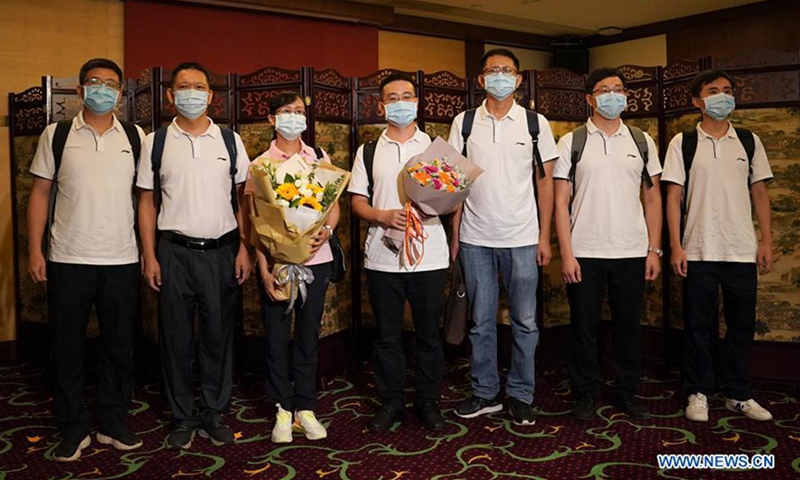'Anti-intellectual' HK opposition concocts rumors against mainland medical aid
By Cao Siqi Source: Global Times Published: 2020/8/3 22:03:40

Virus testing professionals from the Chinese mainland pose for a group photo after their arrival in Hong Kong, south China, Aug. 2, 2020. Seven virus testing professionals from the Chinese mainland arrived in Hong Kong on Sunday afternoon as the first batch of mainland supportive teams to help contain a worsening spread of COVID-19 in Hong Kong. (Xinhua/Li Gang)
As the first medical aid team from the Chinese mainland arrived in Hong Kong to support the city's anti-epidemic work, such help, which the regional government and local residents welcomed for being timely, was politicized by some opposition forces, who concocted rumors to disrupt the work.
Observers from Hong Kong and the mainland said the rumors reflect anti-intellectualism, which shows they are being stupid and shallow, and putting politics ahead of lives.
Social activist Lester Shum, a Tsuen Wan district councilor, and secessionist Joshua Wong made alarmist talk online, claiming that the central government sent people to Hong Kong to test and collect the DNA of Hong Kong residents in the name of epidemic prevention. They claimed that the relevant information would be sent to the mainland to establish a comprehensive scientific and technological monitoring system.
Local medical experts harshly criticized them. Cheung Hon Ming, president of the Association of Licentiates of Medical Council of Hong Kong (ALMCHK), a professional medical organization established in 1995 in Hong Kong, slammed the rumors for being vicious and attempting to throw the city into disorder.
Tong Kai Sing, vice president of the association, noted that such a claim is baseless as the purpose of the testing is to identify the coronavirus. The medical staff must not violate the code of ethics when collecting samples and the use of test samples for other purposes is also not in line with world standards.
Nucleic acid testing is looking for virus genes, while human genes are sequenced and mapped. They are two kinds of analyses with different processes and costs. The genes of ordinary people have no strategic value, Tong told the Global Times on Monday.
Some people from the opposition also slandered the makeshift hospital at the AsiaWorld-Expo, claiming that the hospital is just like a "re-education center." The hospital began receiving COVID-19 patients with mild symptoms since Saturday afternoon.
Such defamation is quite similar to the situation in Wuhan in January, when it began to implement a lockdown to curb the severe epidemic. But such a decision was attacked by some foreign media outlets for a lack of human rights, Tong said. "Looking back, you will find such attacks ridiculous, so it defames the hospital."
Many opposition people gathered at the LIHKG forum website, which was used by large numbers of Hong Kong rioters, to defame the makeshift hospital. However, several posts shared by some of them who were infected and sent to the hospital for quarantine said it was "quite enjoyable" at the hospital.
The posts said the air conditioning was sufficient, and WiFi, power and TV were available, while the food and environment were better than hospitals. "You can go to the bathroom and take a bath, the environment is very clean," it said.
Medical experts also said the rumors also exposed the insufficient knowledge of the opposition of the mainland.
"Some said that doctors from the mainland would create chaos in Hong Kong because they cannot speak English. That is absurd! I have never heard any problems in communication when China sent medical teams to foreign countries, not to mention to the island in our country," Tong said, noting that a majority of academic papers about the coronavirus study on the Lancet medical journal were written by Chinese doctors.
Those rumors also sparked heated discussions on mainland social media platforms. Many netizens on Sina Weibo lashed at the rumormongers for what they called a "white-eyed wolf" - a person who is not grateful. Some urged the team to stop helping the ingrates.
But some Sina Weibo users said they believe most people in Hong Kong love the city and country. They understand that doubts linger because of misunderstandings with the mainland.
On Monday, a Sina Weibo post said a Hong Kong police officer posted part of a conversation between his colleague and a doctor from the mainland medical aid team while on duty.
In the post, the police officer asked the doctor why he came to Hong Kong and suggested he stay in the mainland because the city offers little to them compared to their mission to foreign countries.
However, the doctor said: "I am Chinese and I am working for my country. It is the same when I go there. Even if some people do not welcome us, we will regard all our lives as our priority. We're psyched for any cold talk."
The post touched many netizens, with them saying that Hong Kong police and mainland medical workers are "angels and knights."
"We wish Hong Kong an early end to the COVID-19 epidemic, and the safe return of mainland medical workers," they said.
RELATED ARTICLES:
Posted in: HK/MACAO/TAIWAN